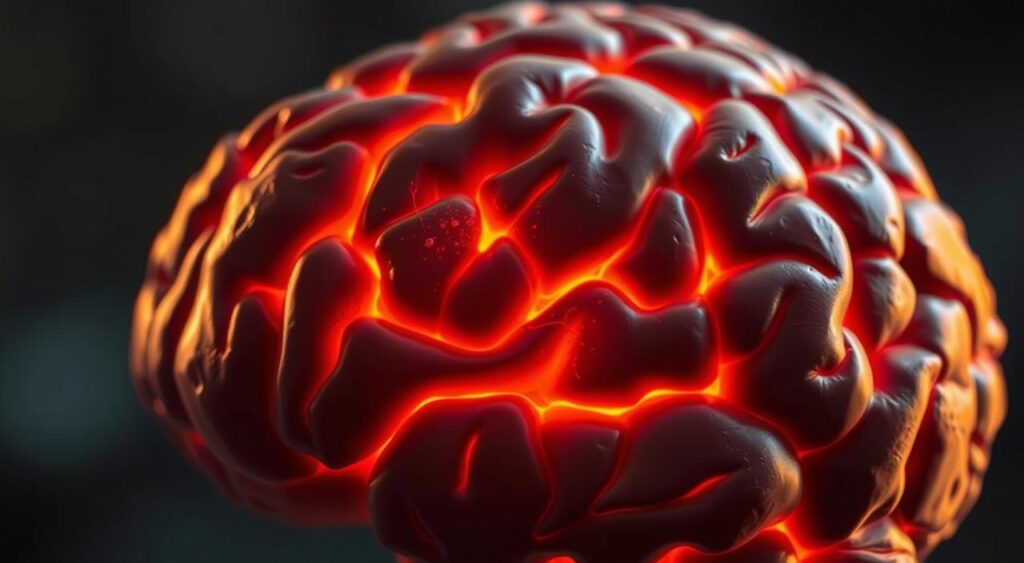Discover effective strategies for managing neurocognitive disorders and reclaiming your quality of life.
Neurocognitive disorders : These conditions include cognitive impairment, which affects daily life and well-being. It’s vital to understand and manage these disorders well.
Neurocognitive disorders can change how people do everyday tasks and live independently. Recognizing the need to manage these disorders is the first step to a better life. It helps lessen the impact of cognitive impairment.

It’s key to know how neurocognitive disorders affect daily life. This knowledge helps find ways to cope and improve well-being. With the right information and support, people can manage their condition better and reduce cognitive impairment’s effects.
Key Takeaways
- Neurocognitive disorders affect millions of people in the United States, with cognitive impairment being a significant aspect.
- These conditions can significantly impact daily functioning and overall well-being.
- Managing neurocognitive disorders is essential for improving quality of life and mitigating the effects of cognitive impairment.
- Understanding the conditions and their impact on daily life is crucial for developing effective coping strategies.
- Empowering individuals with knowledge and resources can help them better manage their condition and reduce the effects of cognitive impairment.
- Early awareness and intervention are critical for effectively managing neurocognitive disorders and cognitive impairment.
Understanding Neurocognitive Disorders: A Comprehensive Overview
Neurocognitive disorders can greatly affect a person’s cognitive function and brain health. It’s key to know the different types to prevent and manage them. Keeping your brain healthy can lower the chance of getting these conditions and keep your cognitive function sharp.
Some common types of neurocognitive disorders include:
- Dementia
- Alzheimer’s disease
- Parkinson’s disease
- Huntington’s disease
Knowing the signs of neurocognitive disorders is vital for early action. Symptoms like memory loss, trouble with communication, and mood changes are common. By spotting these signs early and keeping your brain healthy, you can lower your risk of these disorders.
Preventing these disorders is possible through regular exercise, a healthy diet, and staying socially active. By focusing on brain health and keeping your cognitive function in check, you can reduce your risk. This approach helps maintain overall well-being.
The Impact of Cognitive Decline on Daily Life
Cognitive decline can greatly affect a person’s daily life. It makes it hard to do everyday tasks and stay independent. Memory loss is a big symptom, making it tough to remember things like appointments and when to take medicine.
As it gets worse, it can also mess with how well someone can talk and share their thoughts. This can make them feel stuck and alone.
Here are some ways cognitive decline can change daily life:
- It’s hard to solve problems and make decisions.
- Learning new things becomes a struggle.
- Talking and connecting with others gets tough.
These changes can be really tough, not just for the person but for their family too. It’s key to know how cognitive decline affects daily life to offer the right support and care.
Cognitive decline is a complex condition that needs a full approach to manage and care for. By understanding its impact, we can help improve the lives of those affected.
Early Detection and Diagnosis Methods
Spotting neurocognitive disorders like dementia and alzheimer’s early is key. It helps improve treatment and life quality. Since cognitive decline can be slight, finding signs early is vital.
Tools like memory tests and cognitive screenings can spot dementia and alzheimer’s early. They work alongside medical checks to find what’s causing the decline.
Cognitive Assessment Tools
- Memory tests, such as the Mini-Mental State Examination (MMSE)
- Cognitive screenings, such as the Montreal Cognitive Assessment (MoCA)
Medical Evaluation Process
A detailed medical check is needed to find the cause of cognitive decline. This might include lab tests, imaging, and physical exams.
Importance of Early Intervention
Acting fast is crucial for those with dementia and alzheimer’s. It can slow down brain loss, enhance life quality, and lower risks. Early detection and treatment can greatly improve someone’s health and happiness.
Treatment Options and Medical Interventions
Managing neurocognitive disorders requires a detailed treatment plan. This plan must include a cognitive assessment to measure cognitive decline. It helps doctors find the best ways to help.
Treatment might include medicine, therapy, and changes in lifestyle. Medicine can help with memory loss and confusion. Therapy helps with coping and communication. A healthy lifestyle can slow down cognitive decline.
Some common treatments are:
- Medication to manage symptoms
- Therapy to develop coping strategies
- Lifestyle modifications to slow down cognitive decline
A cognitive assessment is key in creating a treatment plan. It shows what cognitive abilities need help. This way, people with neurocognitive disorders get care tailored to them.

Managing Memory Loss and Cognitive Function
As we get older, our brains naturally slow down a bit. But, there are ways to keep our minds sharp. Doing things that challenge our brains, like reading or solving puzzles, can help. It also helps to learn new things.
Staying active, being social, and eating well are also key. A healthy lifestyle supports our brain health. By doing these things every day, we can fight off memory loss and keep our minds sharp.
Memory Enhancement Techniques
- Practice mindfulness and meditation to improve focus and concentration
- Use mnemonic devices to aid memory recall
- Engage in activities that challenge the brain, such as learning a new language or playing a musical instrument
Cognitive Training Exercises
Doing cognitive training can boost our brain power. It includes tasks like memory games and solving problems. These exercises help build a strong brain reserve.
It’s vital to focus on keeping our brains healthy. By changing our lifestyle and doing cognitive training, we can fight off memory loss. This helps us stay healthy and enjoy life to the fullest.
| Strategy | Benefits |
|---|---|
| Regular exercise | Improves cognitive function, reduces risk of decline |
| Social engagement | Supports cognitive health, reduces risk of isolation |
| Balanced diet | Supports brain health, reduces risk of cognitive decline |
The Role of Nutrition in Brain Health
Eating well is key to keeping your brain healthy and avoiding neurocognitive disorders like cognitive impairment. A balanced diet gives your brain the nutrients it needs to work its best. Without these nutrients, your brain can start to decline.
Important nutrients for your brain include omega-3 fatty acids, antioxidants, and B vitamins. You can find these in fatty fish, nuts, and leafy greens. Eating foods rich in these can help protect your brain and lower the risk of neurocognitive disorders.

But a healthy diet isn’t the only thing that matters. Regular exercise, enough sleep, and managing stress are also crucial. By combining a healthy diet with these lifestyle changes, you can help keep your brain in top shape and avoid cognitive impairment.
Here are some tips for choosing healthier foods:
- Eat a variety of fruits and vegetables
- Include lean proteins in your meals
- Choose whole grains over refined ones
- Try to limit sugary and processed foods
Building a Support System: Family and Professional Care
People with memory loss and cognitive decline need a strong support system. This includes family, professional caregivers, and community services.
A good support system helps those with memory loss stay independent and happy. It also offers emotional support and prevents feelings of loneliness and sadness.
Caregiver Resources
- Education and training on caregiving skills
- Respite care services to provide temporary relief
- Support groups for caregivers to share experiences and advice
Professional Healthcare Team
A team of healthcare professionals can offer medical care and advice. This team includes doctors, nurses, therapists, and social workers.
Support Groups and Community Services
Support groups and community services offer emotional support. They also connect people with resources and services in their area.
| Resource | Description |
|---|---|
| Caregiver support groups | Groups that provide emotional support and guidance to caregivers |
| Professional healthcare services | Medical care and guidance provided by doctors, nurses, and therapists |
| Community services | Services that provide resources and support to individuals with neurocognitive disorders |
Environmental Modifications for Safety and Independence
People with neurocognitive disorders like dementia and Alzheimer’s can benefit from changes in their environment. These changes help them stay safe and independent at home. They make life better for those with these conditions, allowing them to live comfortably in their own space.
Creating a safe and supportive home includes several steps:
- Removing tripping hazards, such as rugs and clutter
- Installing handrails and grab bars in strategic locations
- Improving lighting to reduce the risk of falls
- Using color-coded labels and signs to help with navigation
Also, having structured daily routines and memory aids like calendars and reminders helps. These changes help people with dementia and Alzheimer’s stay safe and independent. They also lower the chance of accidents and injuries.
It’s important to remember that everyone’s needs are different. Environmental changes should be made to fit each person’s specific needs. Working with healthcare professionals and caregivers helps create a safe and supportive home. This promotes independence and well-being for those with neurocognitive disorders.
| Environmental Modification | Benefits |
|---|---|
| Removing tripping hazards | Reduces the risk of falls and injuries |
| Installing handrails and grab bars | Provides support and stability |
| Improving lighting | Enhances visibility and reduces the risk of falls |
Legal and Financial Planning Considerations
People with neurocognitive disorders need to plan their legal and financial affairs. A cognitive assessment is key to this planning. It shows if they can make smart decisions.
Power of Attorney Options
Power of attorney lets someone you trust make choices for you. This can be for money, health, or personal matters. It’s important to talk to a lawyer about this.
Healthcare Directives
Healthcare directives, like living wills, tell what medical care you want if you can’t decide. Make these documents with a cognitive assessment to reflect your current wishes.
Financial Protection Strategies
Strategies like trusts or guardianships protect your money and assets. Talk to a financial advisor to find the right one for you.
Thinking about these legal and financial steps helps ensure your wishes are followed. It makes your future secure.
Research and Future Developments in Neurocognitive Disorders
Today, research aims to boost cognitive function and brain health. New treatments and therapies are being developed. These include cognitive training and changes in lifestyle. This research is key to better treatments and a better life for those with these disorders.
Some exciting new ideas in this field are:
- Personalized medicine, made just for each person’s needs and genes
- Advanced neuroimaging, for quicker and more precise disease tracking
- New treatments like gene therapy and stem cell therapy, to fix and grow brain cells
More research and funding are needed to make progress. By focusing on cognitive function and brain health, we can help those with these conditions. This will improve their lives and overall well-being.
| Research Area | Potential Impact |
|---|---|
| Cognitive Training | Improved cognitive function and daily functioning |
| Neuroimaging | Earlier diagnosis and more accurate disease monitoring |
| Personalized Medicine | Tailored treatments and improved treatment outcomes |
Conclusion: Taking Control of Your Cognitive Health Journey
Neurocognitive disorders can really change someone’s life. They affect daily tasks, relationships, and happiness. It’s key to keep your brain healthy to avoid these issues.
Knowing the risks and signs of these disorders is the first step. You can prevent or manage them by living healthy, doing brain exercises, and getting medical help when needed.
It’s important to remember that these disorders aren’t just a part of getting older. Getting help is the first step to managing them. With the right steps and support, you can boost your brain function and live better.
In short, taking charge of your brain health means being aware and proactive. By focusing on brain health and getting help when you need it, you can face the challenges of neurocognitive disorders. This way, you can improve your life quality.
FAQ
Q: What are neurocognitive disorders and how do they affect cognitive function and brain health?
A: Neurocognitive disorders affect how we think and remember. They can make daily tasks hard. It’s important to manage these conditions to live better.
Q: What are the common symptoms and warning signs of neurocognitive disorders, such as dementia and Alzheimer’s disease?
A: Signs include memory loss and trouble with words. Mood and personality changes are also common. Spotting these early helps a lot.
Q: How can I reduce the risk of developing neurocognitive disorders, such as cognitive impairment and dementia?
A: Eating right and staying active helps. So does keeping your mind sharp and managing health issues. These steps can lower your risk.
Q: What is the importance of early detection and diagnosis of neurocognitive disorders, including cognitive assessment?
A: Finding these conditions early is key. It leads to better treatment and a better life. Early tests and care are crucial.
Q: What are the available treatment options and medical interventions for neurocognitive disorders, including cognitive assessment and therapy?
A: Treatments include tests, medicine, and therapy. A plan made just for you can help manage symptoms. It aims to slow disease and improve life.
Q: How can I manage memory loss and cognitive function, and what are the effective strategies for maintaining good brain health?
A: Use memory tricks and do brain exercises. Eating well and staying active also helps. Keeping your brain healthy is key to avoiding decline.
Q: What role does nutrition play in maintaining good brain health and reducing the risk of neurocognitive disorders, including cognitive impairment?
A: A healthy diet is vital for brain health. Foods rich in omega-3s and antioxidants support the brain. A good diet can also reduce inflammation.
Q: How can I build a support system for myself or a loved one with neurocognitive disorders, including dementia and Alzheimer’s disease?
A: Create a network of family and friends. Use caregiver resources and support groups. They offer help and emotional support, improving life for all involved.
Q: What environmental modifications can I make to create a safe and supportive living environment for individuals with neurocognitive disorders, such as dementia and Alzheimer’s disease?
A: Make your space safe and easy to navigate. Remove dangers and improve lighting. These changes help keep your loved one safe and independent.
Q: What are the legal and financial planning considerations for individuals with neurocognitive disorders, including cognitive assessment and power of attorney options?
A: Plan for the future with legal documents and financial strategies. This ensures your wishes are followed and your finances are safe.
Q: What current research and future developments are being made in the field of neurocognitive disorders, including cognitive function and brain health?
A: Research is ongoing to understand and treat these disorders. New treatments and therapies are being explored. This brings hope for better lives for those affected.
